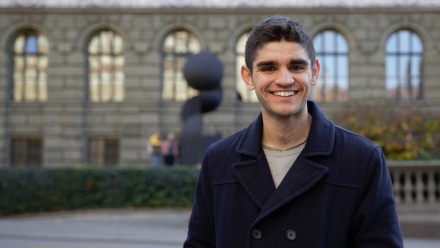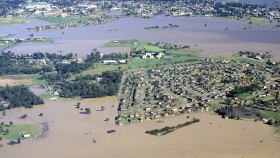Head in the Clouds: ANU undergraduate student's journey to academic publication through cyclone research
As a child growing up in Cairns, Jack Miller was exposed to more cyclones than most Australians, and he particularly remembers being evacuated from his home and experiencing the destructive impacts of Cyclone Yasi in 2011. These experiences increased Jack’s interest in cyclones, yet he still didn't think much about how they form. “It’s weird but I’d never looked at clouds before, actually looked at clouds and what they mean for the instability of the atmosphere.”
In his first year as a Bachelor of Philosophy (Honours) (PhB) student at The Australian National University (ANU), Jack was given an opportunity to do just that. On his lecturer’s recommendation, Jack applied for a Research Assistant role at the ANU Institute for Climate, Energy and Disaster Solutions (ICEDS), to explore the feasibility of various cyclone interventions. While the concept of intervening to potentially weaken or even stop cyclones initially seemed to Jack like “a bit of a wacky idea straight out of the 1960s space race,” some digging demonstrated that it might not be as impossible as it appeared.
Supported by ICEDS Director Professor Mark Howden and ICEDS Head of Disaster Solutions Associate Professor Roslyn Prinsley, Jack’s initial work was to conduct a technical review of cyclone interventions including cloud seeding, sea surface temperature modification, high altitude particle injection, and aerosol injection. While past experiments such as the US government’s Project Stormfury in the 1960s and 70s were unsuccessful, Jack determined that other technologies, such as high-altitude particle injection and aerosol injection hold promise.
Jack’s review of potential interventions was supplemented by governance and risk research by ANU PhD candidate Aaron Tang, and by cyclone modelling and meteorology expertise from ICEDS Research Fellow, Dr Thao Linh Tran. This interdisciplinary approach allowed the team to consider not just the potential feasibility of various interventions, but also the ecological, governance and social implications. Cyclones don’t take note of national borders, and therefore the logistics and politics of potential cyclone intervention are incredibly complex. If not well managed, these technologies would be vulnerable to exploitation for political or economic purposes. Governance of both the research and deployment of these technologies must be considered carefully.
As an undergraduate Research Assistant, Jack was able to take this research and lead the writing of a paper for the Journal of Climate Risk Management, as well as co-writing an article for The Conversation. Jack tells us this helped him build his confidence and the realisation that even though he is still an undergraduate, he was able to achieve something important. Roslyn shares that several senior researchers were so impressed with Jack’s work that they asked when he’d completed his PhD. Jack’s initial research with ICEDS also helped him become part of a team that won an ICEDS Seed Funding grant in 2022 to explore AI generation of cyclone data.
Working in an interdisciplinary team on this cyclone research was formative for Jack. He realised that his understanding of concepts like ‘risk,’ and his perception of the ‘rational’ nature of decision-making, didn't reflect how things work in the real world. “I realised that humans aren’t always rational, especially in disaster situations.”
He also found that interdisciplinary work was a great way to solve challenging problems.
“I really believe in interdisciplinary research work, because I think the best way to move a field forward is to bring together different, more disparate fields. That's the easiest way to push innovation, because you bring in new ideas and novel concepts.”
Jack hopes that he can take his learnings about interdisciplinary research into his future career. While he’s currently looking ahead to his Honours year where he plans to do research in quantum chemistry and machine learning, he hopes to come back to climate research in the future. “Climate change is a central challenge for this century, and I’d like to come at it from a unique perspective.”
Jack also has advice for other students interested in research. He encourages others to read broadly, and not feel the need to specialise too early. “I think you should keep your interests open. Especially if you want to go into something like research, or even something like entrepreneurship. Keeping your interests as wide as possible gives you the greatest scope for having new ideas and to contribute.” Jack also encourages students to talk to and get to know as many other researchers as possible. "I really think research is a social activity a lot of the time. You have to be open to meeting new people.” These new people might be senior researchers, but Jack also felt very supported by the other undergraduate students surrounding him, and exemplifying what he could achieve.
As Jack’s ICEDS supervisor, Associate Professor Roslyn Prinsley reflects that “experiences like Jack’s increase students’ confidence in their research skills and boost awareness of what a career in research can be like. It is a chance for them to explore fascinating questions, learn from more senior academics while sharing their own new ideas, and stretch their creative and critical thinking. Research provides students with a unique opportunity to apply their skills to actively participate in expanding the frontier of knowledge.”











